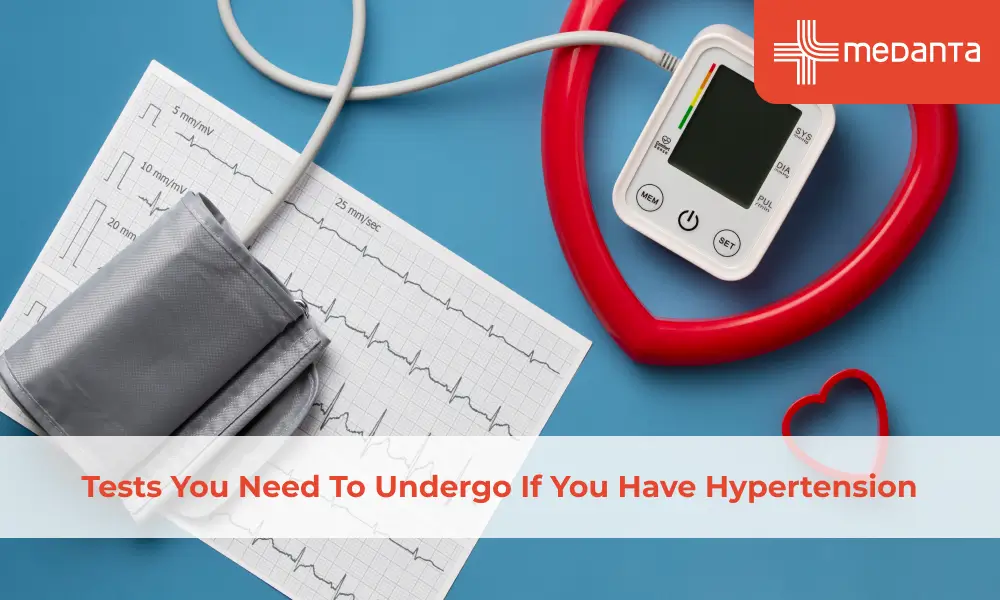Tests You Need To Undergo If You Have Hypertension

Hypertension is a global epidemic that is quickly becoming one of India’s most common lifestyle diseases. Unmanaged hypertension can lead to severe organ damage and is usually the driving cause for cardiac diseases like heart attacks.
The good news, however, is that hypertension usually takes years to cause serious damage (unless suddenly elevated to very high level) and early diagnosis and intervention can help prevent this damage. The key steps in this process revolve around the identification of the symptoms and underlying cause of hypertension, look for other risk factors of heart disease and assess if hypertension has already caused damage to your body.
Read on to know more about some of the most vital tests that your doctor is likely to prescribe for hypertension.
Important Medical Tests for High Blood Pressure
In nearly 95% of cases, hypertension is itself a disease. However, in the remaining 5% of cases, hypertension occurs due to some other underlying disease. in such cases, diagnosing the underlying disease becomes important because not only that disease needs to be treated, correcting it also controls blood pressure.
Tests to Determine The Underlying Causes of Hypertension
Urine tests to look for any kidney disease
Blood tests for checking imbalances in kidney function (blood urea and creatinine levels), electrolytes, thyroid function
Ultrasound tests to look for any kidney disease
Tests to Determine The Underlying Diseases Responsible for Hypertension
In some cases, when it appears that hypertension is due to some underlying disease, but that disease is not apparent on the above tests, some advanced tests may be required. These includeBlood tests for measuring various hormone levels
Urine tests for measuring various hormone levels
Doppler test for kidney arteries
CT scan of the abdomen to look for some gland abnormalities
Testing For Other Risk Factors of Heart Disease
The risk of damage to blood vessels increases greatly in those individuals who also have other risk factors for heart disease. Hence, it is very important to perform an overall assessment of an individual’s heart disease risk. The tests that are helpful for this purpose are:Blood glucose and glycosylated haemoglobin for diabetes
Blood cholesterol level
Testing for Hypertension Related Cardiac Damage
Hypertension often causes damage to blood vessels without producing any symptoms initially. Hence, it is important to regularly monitor for any ongoing damage to various organs in the body. Here are some of the tests your doctor would recommend to detect signs of any damage due to hypertension:Ophthalmoscopic tests to identify signs of hypertensive damage to the eyes
Urine examination, including tests of urine protein levels and urine protein-creatinine ratio for detecting kidney damage
X-Ray Imaging to identify any abnormalities in the size of your heart
Electrocardiogram (ECG OR EKG) to monitor the electrical activity of the heart. It can help diagnose common hypertension-related cardiac complications like hypertrophy, muscle damage, ischemic disease and more
Cardiac Ultrasound or Echocardiogram to capture and transmit images of the beating heart to a video screen. The test can accurately identify hypertension-related damage to the heart in the form of increased muscle thickness, stiffening of the heart muscle and weakness of heart chambers
Arterial Stiffness Assessment, a non-invasive test that monitors the condition of the blood vessels. Hypertension leads to stiffening of the blood vessels which ultimately causes all the damage to the organs. Arterial stiffness measurement can diagnose it at an early stage.
It is easy to see that hypertension is a complex lifestyle ailment that can lead to a host of side effects in different areas of our body. This is why it is important to opt for a hospital that follows a multi-dimensional approach when it comes to testing for hypertension and strives to avoid common biases and errors that lead to misdiagnosis.






